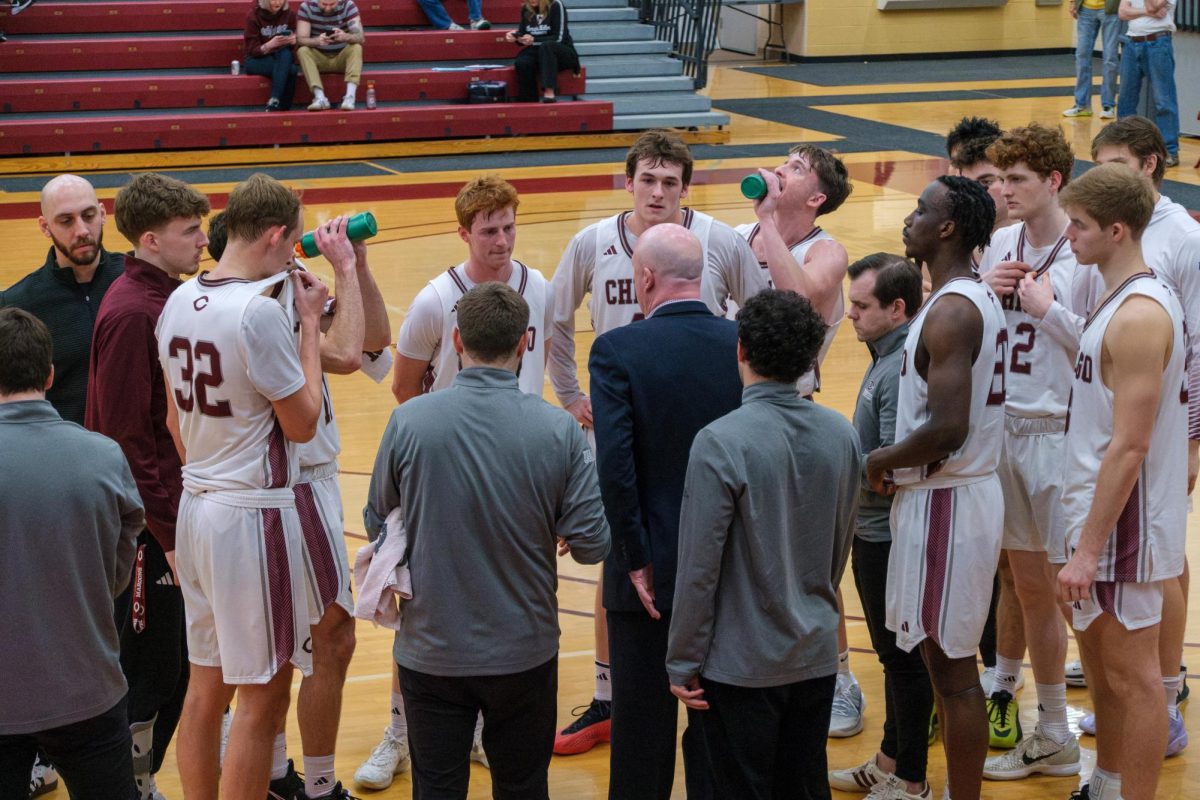It’s prime time for Chicago tennis this season.
With schedules stacked with D-I opponents early in the campaign, both the men and women are upping their game, and so far the young squads have shown that they can handle the extra competition. The push to see strong opponents has been gearing the Maroons to take on the UAA, which boasts three nationally ranked teams on both the men’s and women’s sides.
For the men, this meant opening the winter against their toughest foes of the season. A trip up to D-I Northwestern ended with a 6–1 loss, but the South Siders got a glimpse of what first-year Will Zhang could do. The rookie handed Chicago its only point of the match, getting the best of the Wildcats’ top newcomer, Peter Rispoli, at third singles.
“In my opinion, that was the biggest win in recent school history,” head coach Marty Perry said. “Last week [Rispoli] almost won at four at Notre Dame, and Notre Dame is top 10 in the country.”
Zhang took the opening match 7–6 (3–0) to put the momentum in his favor before falling in the next round to Rispoli 6–3. With victory locked up for the Wildcats, the pair played a deciding tiebreaker, with Zhang pulling ahead 10–7 for the win.
The Northwestern bout won’t be the last critical showdown for Zhang, who anchors the 5 rookies on the 13-man roster as the highest-ranked junior player coming into Chicago. This weekend at UW–Whitewater (4–2) he took his second start at first singles, squaring off against second-year Robin Borg, the son of five-time Wimbledon champion Bjorn Borg.
“I didn’t really put him on a higher level because of his dad,” Zhang said. “I played it as a typical match.”
A well executed game plan set Zhang on his way to besting Borg. Forcing a fast pace, he managed to keep Borg on the move and work his opponent’s bigger size against him. Standing up to Borg’s powerful serve gave the rookie the final edge in nailing down the straight sets victory.
Paced by Zhang’s 6–4, 6–4 edging of Borg at the top spot, the Maroons smashed the Warhawks 7–2 and extended their winning streak to three matches to improved to 3–1 on the season. The South Siders dropped just one singles contest in a region known for strong solos competition. Whitewater gained its other point on the day with Borg and third-year Alex Lowe cruising by second-years Lado Bakhutashvili and Steve Saltarelli 8–2 at first doubles.
Battles like the ones between Zhang and Borg show just how much talent can be found in D-III tennis. Unlike major team sports like football and basketball where there can be a sharp line between DI and DIII, the distinction isn’t as clear in tennis, making it hard to pinpoint the level of opposition to expect when crossing over to the big time. But look for D-I opponents to become a steady part of the Maroons’ schedule.
NCAA regulations don’t restrict inter-division scheduling, granting coaches free rein in deciding how to fill up the maximum 20 matches allowed for the regular season. The connections between Perry and head coaches at D-I schools like Northern Illinois, UW–Green Bay, and Citadel could make dates with the Huskies and the Bulldogs annual events.
Despite the number of rookies on both teams this season, the programs have reached the point where there’s nothing to lose and everything to gain from stepping up to DI. Inter-division contests don’t affect national rankings and come with the obvious benefit of helping the South Siders get stronger by facing tougher lineups. It’s a good deal for teams like Northwestern and Chicago State, too, who contacted Chicago about playing, because they can work in a warmup match.
“I’m not too surprised by how we’ve handled the schedule,” Perry said. “I guess I’m a little surprised that we took a point off of Northwestern singles.”
Answering the call to test their skills against D-I foes, the 19th-ranked women’s squad has responded with a 7–2 victory over Chicago State to kick off the winter and a close 4–3 loss to Northern Illinois February 2. Having only one recruited freshman, Chrissy Hu, on the team has left the Maroons a little short in the depth department this year, but they can follow the lead of the powerful one-two punch of second-year Marissa Lin and third-year Vindya Dayananda.
Like their male counterparts, the women haven’t let the large number of rookies stop them from branching out of DIII. Players like third-year Anuja Parikh, who is set to be a key contributor as she continues to recover from foot surgery this summer, indicate how the bottom of the lineup have met the D-I challenge.
In her first and only match since the UAAs last April, Parikh started against Northern Illinois third-year Jenny Edner at fifth singles. Parikh notched a number of match points but ultimately came up short in a 6–7, 7–5, 6–3 bout with Edner, who defeated teammate Dayananda last year.
“That’s a really good sign to see her come back in her first match and put herself in that kind of position against a very good opponent and keep it together,” Perry said.
D-I competition is in the rear view mirror for the women, who came out at an even 1–1, but the men still have Green Bay and Citadel to look forward to in their midseason form. With the chance to having a winning season against D-I opponents, the men still have a powerful opportunity to make a statement about Chicago athletics and score one for the little guy.







